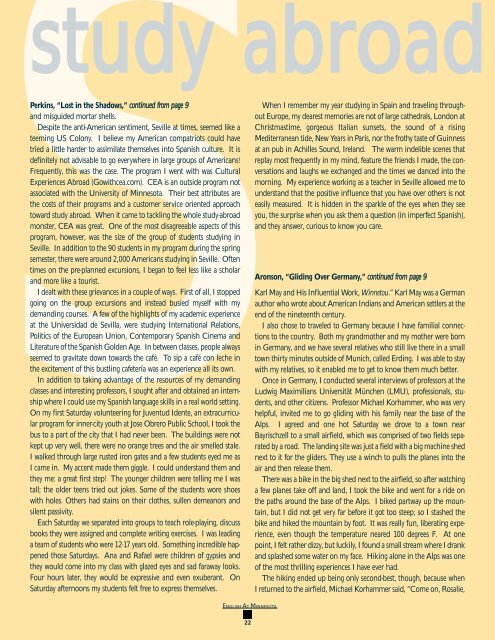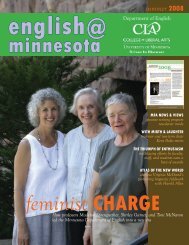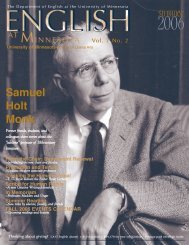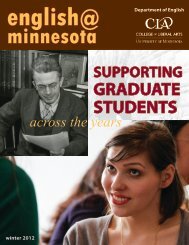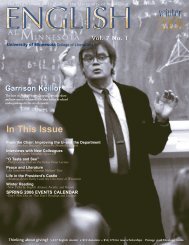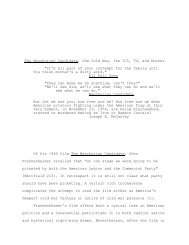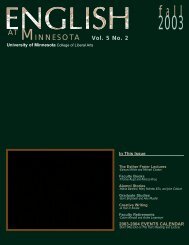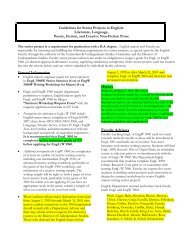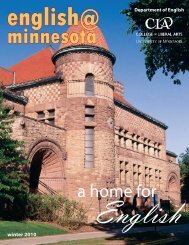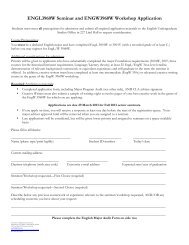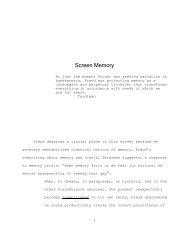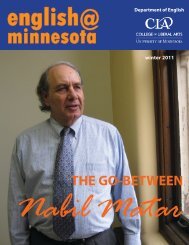spring M - Department of English - University of Minnesota
spring M - Department of English - University of Minnesota
spring M - Department of English - University of Minnesota
Create successful ePaper yourself
Turn your PDF publications into a flip-book with our unique Google optimized e-Paper software.
study abroadSPerkins, “Lost in the Shadows,” continued from page 9and misguided mortar shells.Despite the anti-American sentiment, Seville at times, seemed like ateeming US Colony. I believe my American compatriots could havetried a little harder to assimilate themselves into Spanish culture. It isdefinitely not advisable to go everywhere in large groups <strong>of</strong> Americans!Frequently, this was the case. The program I went with was CulturalExperiences Abroad (Gowithcea.com). CEA is an outside program notassociated with the <strong>University</strong> <strong>of</strong> <strong>Minnesota</strong>. Their best attributes arethe costs <strong>of</strong> their programs and a customer service oriented approachtoward study abroad. When it came to tackling the whole study-abroadmonster, CEA was great. One <strong>of</strong> the most disagreeable aspects <strong>of</strong> thisprogram, however, was the size <strong>of</strong> the group <strong>of</strong> students studying inSeville. In addition to the 90 students in my program during the <strong>spring</strong>semester, there were around 2,000 Americans studying in Seville. Oftentimes on the pre-planned excursions, I began to feel less like a scholarand more like a tourist.I dealt with these grievances in a couple <strong>of</strong> ways. First <strong>of</strong> all, I stoppedgoing on the group excursions and instead busied myself with mydemanding courses. A few <strong>of</strong> the highlights <strong>of</strong> my academic experienceat the Universidad de Sevilla, were studying International Relations,Politics <strong>of</strong> the European Union, Contemporary Spanish Cinema andLiterature <strong>of</strong> the Spanish Golden Age. In between classes, people alwaysseemed to gravitate down towards the café. To sip a café con leche inthe excitement <strong>of</strong> this bustling cafetería was an experience all its own.In addition to taking advantage <strong>of</strong> the resources <strong>of</strong> my demandingclasses and interesting pr<strong>of</strong>essors, I sought after and obtained an internshipwhere I could use my Spanish language skills in a real world setting.On my first Saturday volunteering for Juventud Idente, an extracurricularprogram for inner-city youth at Jose Obrero Public School, I took thebus to a part <strong>of</strong> the city that I had never been. The buildings were notkept up very well, there were no orange trees and the air smelled stale.I walked through large rusted iron gates and a few students eyed me asI came in. My accent made them giggle. I could understand them andthey me: a great first step! The younger children were telling me I wastall; the older teens tried out jokes. Some <strong>of</strong> the students wore shoeswith holes. Others had stains on their clothes, sullen demeanors andsilent passivity.Each Saturday we separated into groups to teach role-playing, discussbooks they were assigned and complete writing exercises. I was leadinga team <strong>of</strong> students who were 12-17 years old. Something incredible happenedthose Saturdays. Ana and Rafael were children <strong>of</strong> gypsies andthey would come into my class with glazed eyes and sad faraway looks.Four hours later, they would be expressive and even exuberant. OnSaturday afternoons my students felt free to express themselves.When I remember my year studying in Spain and traveling throughoutEurope, my dearest memories are not <strong>of</strong> large cathedrals, London atChristmastime, gorgeous Italian sunsets, the sound <strong>of</strong> a risingMediterranean tide, New Years in Paris, nor the frothy taste <strong>of</strong> Guinnessat an pub in Achilles Sound, Ireland. The warm indelible scenes thatreplay most frequently in my mind, feature the friends I made, the conversationsand laughs we exchanged and the times we danced into themorning. My experience working as a teacher in Seville allowed me tounderstand that the positive influence that you have over others is noteasily measured. It is hidden in the sparkle <strong>of</strong> the eyes when they seeyou, the surprise when you ask them a question (in imperfect Spanish),and they answer, curious to know you care.Aronson, “Gliding Over Germany,” continued from page 9Karl May and His Influential Work, Winnetou.” Karl May was a Germanauthor who wrote about American Indians and American settlers at theend <strong>of</strong> the nineteenth century.I also chose to traveled to Germany because I have familial connectionsto the country. Both my grandmother and my mother were bornin Germany, and we have several relatives who still live there in a smalltown thirty minutes outside <strong>of</strong> Munich, called Erding. I was able to staywith my relatives, so it enabled me to get to know them much better.Once in Germany, I conducted several interviews <strong>of</strong> pr<strong>of</strong>essors at theLudwig Maximilians Universität München (LMU), pr<strong>of</strong>essionals, students,and other citizens. Pr<strong>of</strong>essor Michael Korhammer, who was veryhelpful, invited me to go gliding with his family near the base <strong>of</strong> theAlps. I agreed and one hot Saturday we drove to a town nearBayrischzell to a small airfield, which was comprised <strong>of</strong> two fields separatedby a road. The landing site was just a field with a big machine shednext to it for the gliders. They use a winch to pulls the planes into theair and then release them.There was a bike in the big shed next to the airfield, so after watchinga few planes take <strong>of</strong>f and land, I took the bike and went for a ride onthe paths around the base <strong>of</strong> the Alps. I biked partway up the mountain,but I did not get very far before it got too steep; so I stashed thebike and hiked the mountain by foot. It was really fun, liberating experience,even though the temperature neared 100 degrees F. At onepoint, I felt rather dizzy, but luckily, I found a small stream where I drankand splashed some water on my face. Hiking alone in the Alps was one<strong>of</strong> the most thrilling experiences I have ever had.The hiking ended up being only second-best, though, because whenI returned to the airfield, Michael Korhammer said, “Come on, Rosalie,ENGLISH AT MINNESOTA22


